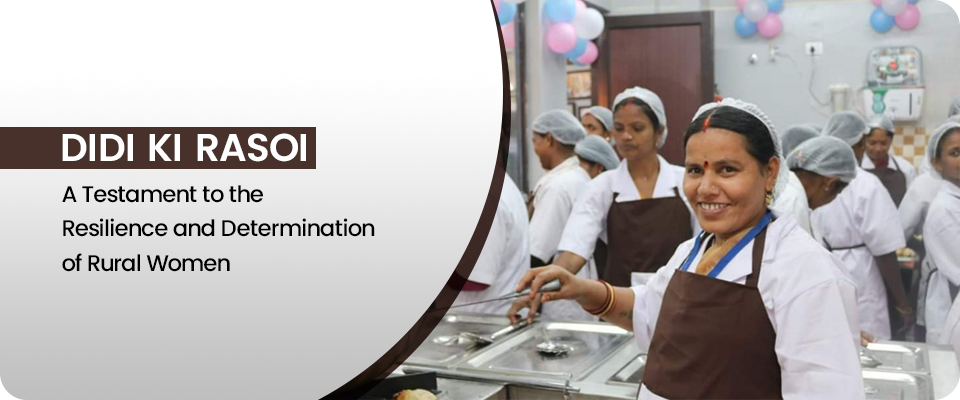![]() English
English
Change
Didi Ki Rasoi- A Testament to the Resilience and Determination of Rural Women

DKR, famously known as Didi Ki Rasoi, made headlines in the Indian news from the time it first launched officially in 2018, supported by BTDP (Bihar Transformative Development Project). The food enterprise was started by a group of rural women based in Bihar as a part of the World Bank. It is administered by JEEViKA, also known as Bihar Rural Livelihoods Promotion Society to establish and provide food counter services through ‘Didi Ki Rasoi’. Didi Ki Rasoi is a truly successful representative of entrepreneurship, providing standard quality homemade meals to hospitals for patients, to the banks for the officials, and for school-going children.
Didi Ki Rasoi was initially inspired by Kudumbashree Cafe, which is located in Kerala as well. The first outlet of the food chain was launched in the Vaishali, a district in Bihar, which was later expanded to the remaining 38 districts of Bihar, as reported by the World Bank. At the moment, there are over 97 Didi Ki Rasoi kitchens spread throughout the state, where they provide services to the district hospitals, SBI offices, major health centres, RBI offices, up to fourteen residential schools, and mental asylums. In this women-owned kitchen, there are currently over 1200 female entrepreneurs and around 2000 females employed in the business, and they are advocated by around 20 experienced and knowledgeable counsellors in catering and hotel management.
Before the introduction of DKR to nine more medical colleges and hospitals earlier this year. Rahul Kumar, the CEO (Chief executive officer) of JEEViKA officially gave a statement. He commented, “These kitchens will provide food four times a day at a fixed price of Rs 150 to indoor patients with a provision of reimbursement of the total cost by the government on submission of claims by the hospitals for the same. Jeevika wanted to begin this service from Patna Medical College and Hospital (PMCH), but the only problem was that the hospital is undergoing a mega development plan involving construction work. Hence, we have to wait to find a suitable place for the kitchens at PMCH.”
As per official reports’ references, every government organisation such as banks, medical colleges, schools, hospitals, and other associations get to relish meals that are not only prepared and home-cooked but also super affordable, wholesome, and nutritious. Nutritional foods like eggs, milk, and fruits are usually served for breakfast; Rice, dal, roti, and seasonal vegetables are served for luncheon and dinner; And during the late afternoon, chai and biscuits are given as a light snack. The food cuisine of the canteen has been a little more flexible for the consumers by adding more local delicacies such as Kachoris and Litti. It is also noteworthy to mention that almost all the primary commodity is acquired from local farmers and manufacturing groups connected to livelihoods. As Dr Jitendra Nath, a civil surgeon at a district hospital in Buxar, states, “We have ensured timely construction of the DKR and we are happy with the feedback that we receive from the patients and customers”. Generally, Didi Ki Rasoi records approximately 350-400 footsteps per day at district hospitals and earns an average of ₹2.5 lakhs per month with a turnover surplus of approximately 15 per cent.
According to a case study, Leela Devi, a mother, a wife, and an employee of Didi Ki Rasoi, wakes up at 4 AM before the sun rises and gets herself busy in the kitchen as soon as possible. She then prepares breakfast and lunch for her whole family, while also helping her children get ready for school. The mom of three from Baghmanjhua village starts her busy by hustling for her family and then sets for Koilwar Mental Asylum Hospital, which is 7 kilometres away from her residence. Leela Devi departs from her home in a conventional saree, and after she reaches the hospital, she puts on a white coat on top of her saree. Then she wraps her head with a bouffant cap and sports an apron over the coat. Her shift in the DKR kitchen starts at 6:30 AM, which is to prepare breakfast and lunch for the staff and patients in the hospital.
Leela Devi comments, “My husband works in a grocery store, and it is not easy to manage the household expenses with just his earnings. At first, I was hesitant. I had no experience of working in a canteen or restaurant or with customers. But with family support, I thought let’s try.” Along with the other female employees, Leela Devi hustles in DKR’s canteen and kitchen, where over 250 customers come and eat food each day. The cafeteria is operated by 26 female staff who take turns in two shifts and prepare meals for the attendants, patients, visitors, and staff of the hospital. Leela, who could complete her education only till standard 8, now supports her family with a salary between ₹8,000 to ₹10,000 per month through DKR. She goes on to explain, “Before working in Didi’s kitchen, I was a simple woman; I did not have any identity or anything special. Didi’s kitchen has given me a sense of self-respect. Don’t have to ask for money.”
Another 32-year-old didi, Priyanka Devi, from Panditpur village, which is approximately 10 kilometres from Buxar District Hospital, has been employed at Didi Ki Rasoi Hospital canteen since 2019. Priyanka is gratified with her work as she can manage her family and pay for her children’s education with the salary she receives from the kitchen. According to her, when she initially joined the kitchen of Didi Ki Rasoi, she was worried about her ability to prepare meals for so many people at once, since she comes from a family of five and has never cooked that amount of meals in her life. However, with the help and encouragement from other didis, Priyanka did not take long enough to get herself familiar with the job. She says, “Now I find cooking and managing food in the canteen where more than 250 people eat thrice a day easier and I enjoy it a lot.”
Priyanka Devi is accounted to have left her home in the village while working at DKR and even travelled to various states and districts as well, which was completely new to her as she recalls. She unravels her memory of the time she travelled to Odisha, a neighbouring state, to visit the Saras Mela. It was her very first time exploring another place that is outside her own village. She recounts, “I was constantly thinking only of bad things. But then I realized that if you treat people like family, others treat you like that too. Working in Didi’s kitchen, I had to step out of my comfort zone. Got courage and self-confidence.”
Priyanka, along with other ladies, established a food booth at the Saras Mela and sold food and meals to the customers visiting the mela, where they even made lunch set delivery to the administration of the District Magistrate during occasional meetings. Furthermore, the group of women led by Priyanka also worked on preparing and distributing meals during the regional elections and the global covid pandemic for a multitude of people.
Until now, JEEViKA has established high-quality meal platforms for the Patna branch of the Reserve Bank of India and State Bank of India and is currently undertaking inspiration and influence from market-based benchmarks similar to Kiosks. The main purpose is to operate businesses in crowded areas. Many inherited corporations have ventured into food services as well, both on wide-reaching private and government institutions such as UNICEF and CARE that are seeking to sign a partnership deal with food delivery apps. Comprehending the sensation of these food outlets, numerous states of India have embraced this prototype, which is sponsored by NRETP (National Rural Economic Transformation Project). The World Bank is under the arrangement of the project in partnership with the Ministry of Rural Development in India.
It is a fact that Didi Ki Rasoi is one among the numerous ventures instituted by JEEViKA with the governance of BTDP (Bihar Transformative Development Project). Aside from the interventions of agricultural aspects and nutritional elements, the scheme has successfully promoted and encouraged women-owned businesses or the powerful sentiment of women empowerment in various other development departments of India as well. Some of the instances to name are ‘Grameen Bazaar’ in the retail department, ‘Madhugram’ in the beekeeping department, and ‘Shilpgram’ in the arts and crafts department.




